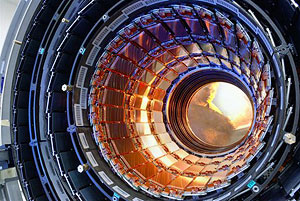Ru
|
Eng
Belarusian scientists help process Large Hadron Collider data
10.03.2014

A group of Belarusian scientists processes the data generated by the Large Hadron Collider and the detector in the European Center for Nuclear Research (CERN), BelTA learned from Yuri Kurochkin, Chairman of the Belarusian Physics Society, Head of the Theoretical Physics Lab of the B.I. Stepanov Physics Institute of the National Academy of Sciences of Belarus. The information was released during the international symposium on processes and structures regarding subatomic particles, nuclei, atoms, and the university. The symposium was held on 10 March to mark the 100th anniversary since the birthday of academician Yakob Zeldovich.
The operation of the Large Hadron Collider has been suspended for reconstruction that will increase its capabilities and the detector’s capabilities. The work, however, has not been stopped, since the LHC’s operation produced an immense amount of data that needs processing, noted Yuri Kurochkin. Scientists of the Physics Institute of the National Academy of Sciences of Belarus, the National Center for High-Energy Particles Physics of the Belarusian State University, and the Nuclear Research Institute are involved in the processing of the data. “They are looking into correlations between the particles which are ‘born’ in large numbers and resemble each other. These particles are responsible for the nuclear force in atom nuclei,” said the scientist.
Belarusian scientists are also trying to ascertain whether the Higgs boson particle is related to dark energy and dark matter. Yuri Kurochkin remarked that by researching the Higgs boson particle scientists try to understand the world, learn what the world is made of, what forces operate in nature, why the Earth does not fall apart.
At the symposium Belarusian scientists presented their latest researches regarding the Higgs boson particle, researches in heat and mass transfer problems, physical chemistry, the development of nuclear power engineering and space exploration. Sergei Kilin, Chief Academic Secretary of the National Academy of Sciences of Belarus, a corresponding member of the Academy, noted that the development of nuclear power engineering is an important direction for Belarus. “Participants of the conference discussed all the problems relating to physics and recalled the universal nature of physics, the fact that physics studies our entire world starting with galaxies and ending with the smallest cells, atoms, and molecules,” said Sergei Kilin.
The symposium gathered scientists from Italy, Belarus, Russia, Armenia, Poland, India, and France.
The operation of the Large Hadron Collider has been suspended for reconstruction that will increase its capabilities and the detector’s capabilities. The work, however, has not been stopped, since the LHC’s operation produced an immense amount of data that needs processing, noted Yuri Kurochkin. Scientists of the Physics Institute of the National Academy of Sciences of Belarus, the National Center for High-Energy Particles Physics of the Belarusian State University, and the Nuclear Research Institute are involved in the processing of the data. “They are looking into correlations between the particles which are ‘born’ in large numbers and resemble each other. These particles are responsible for the nuclear force in atom nuclei,” said the scientist.
Belarusian scientists are also trying to ascertain whether the Higgs boson particle is related to dark energy and dark matter. Yuri Kurochkin remarked that by researching the Higgs boson particle scientists try to understand the world, learn what the world is made of, what forces operate in nature, why the Earth does not fall apart.
At the symposium Belarusian scientists presented their latest researches regarding the Higgs boson particle, researches in heat and mass transfer problems, physical chemistry, the development of nuclear power engineering and space exploration. Sergei Kilin, Chief Academic Secretary of the National Academy of Sciences of Belarus, a corresponding member of the Academy, noted that the development of nuclear power engineering is an important direction for Belarus. “Participants of the conference discussed all the problems relating to physics and recalled the universal nature of physics, the fact that physics studies our entire world starting with galaxies and ending with the smallest cells, atoms, and molecules,” said Sergei Kilin.
The symposium gathered scientists from Italy, Belarus, Russia, Armenia, Poland, India, and France.
SCIENCE. TECHNOLOGY. INNOVATIONS
13.08.2024
28.06.2024
28.06.2024
25.06.2024
05.06.2024
15.05.2024
15.05.2024
26.04.2024
26.04.2024
26.04.2024













